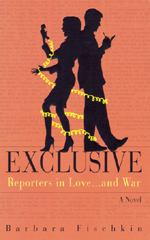

Exclusive
by Barbara Fischkin
Non Fiction
Excerpt. © Reprinted by permission. All rights reserved.
My husband, Jim Mulvaney, dashing and handsome though he may be, is delusional about his appeal to the human race. Let me walk you inside his brain: It is a Saturday in America. Summer. Inside Mulvaney’s brain, it is always summer. No school, no shoes, no shirts. Not even his favorite shirts, plaid with coffee stains. On this sunlit day, men are mowing lawns, pitching baseballs to their sons, having sex with their wives. Suddenly, all these Viagra-free specimens, all these fathers of exclusively male children, have a single thought.
They all want to go to the movies.
And why is that?
The Jim Mulvaney Story.
“Mulvaney!” I say. “You have to be kidding.”
He isn’t.
“Their wives will love it, too,” he tells me.
His blue eyes flash like a smile; that is never a good sign. My middle-aged, long-term husband still believes that every one of his stories is a gem. Even the ones he makes up. As in: Is that “true-true” or “Mulvaney-true”?
Some of his stories are gems.
He was, for example, the last white guy out of Tiananmen
Square.
That’s a true-true story, packed with danger and suspense.
Unless you’ve heard it twenty, thirty times.
I have.
Now, when those eyes of his gleam and he starts using the little Mandarin he knows, I fake a paper cut, an asthma attack, a hemorrhage if need be.
But let’s get back to the movie.
“Mulvaney,” I say, “I just can’t see people rushing off in droves to see a movie about a middle-class kid from Queens who became a newspaper reporter.”
This is when he reminds me that he wasn’t just a newspaper reporter.
“I was a foreign correspondent,” he says, affecting the professorial tone he developed at forty.
“So were half your friends, Mulvaney. You don’t see them foaming at the mouth to tell their life stories.”
He swaggers up to his certificate.
“I know,” I say. “You won a Pulitzer Prize. So did three-quarters of your friends.”
“Barbara,” he says, “need I remind you that I was the last white guy out of Tiananmen Square?”
No matter where he works, my husband will always be the quintessential newspaper reporter. He understands the criminal mind, the tortured psyche of the downtrodden. So why does he have such a hard time figuring out himself? He can’t, for example, imagine why he isn’t rich. It’s not, he says, as if he doesn’t try. Over the years, he has proposed any number of get-rich-quick schemes, including the manufacture of one-size-fits-all dentures. “I need you in on this” is what he always tells me. “Mulvaney,” I say, “I am a writer, not a dental hygienist.” If I have one job as a wife, it is to dissuade Mulvaney. He says we would be rich if I helped him. I say we would be rich if he had a longer attention span.
“We’ll need a book to go with the movie,” he says.
I want to be my husband’s biographer about as badly as I want to open a restaurant that serves fried bugs (another can’t-lose “moneymaker,” based on a Mexican concept that would not have traveled well).
“You’ve got it backward,” I say, hoping to distract him. “Books come first, or at least they should.”
“You have to write the book,” he says. “You are a writer and you know me better than anyone in the world.”
Often, I wish I didn’t.
“Maybe we both can write the movie and the book,” he says. “We can write together.”
I remind him we do very little together without having an argument. Taking out the garbage requires an arms negotiator and a peace accord. The word that comes to most people’s minds when they describe us is “incompatible.”
Even my mother agreed that Mulvaney and I were incompatible, although she did not see this as a problem.
“Marriage, dear, is not about daily comforts,” she told me. “It’s not about getting along and it’s certainly not related to anyone’s career.”
Who, I asked her, said anything about marriage? “Who said anything about marrying Mulvaney?”
“Marriage,” my mother insisted, “is about whether you can tell funny stories, even in hard times, preferably about one another.”
She believed we could, perhaps should, invent those stories. Like Mulvaney, my mother is not a stickler for veracity.
Copyright © 2008 Barbara Fischkin
Photography by Christopher Zach